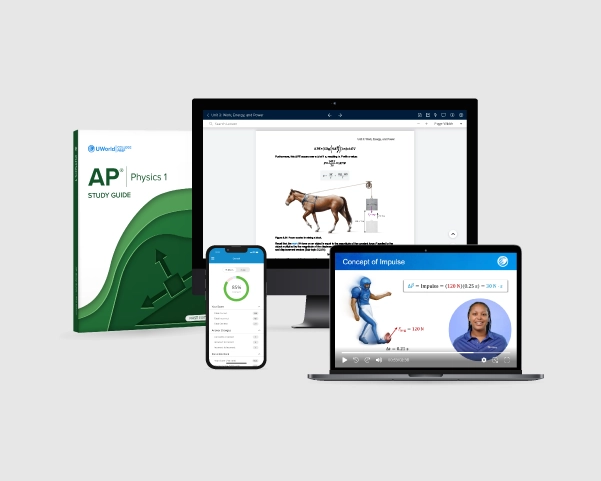Conquer AP Physics with UWorld! This guide will help you master complex physics concepts, build strong problem-solving skills, and ace the exam. Let's dive into a step-by-step approach to effective self-study.
Step 1: Start with UWorld’s AP Physics Study Guide for Foundational Knowledge
Building a strong foundation is essential when self-studying AP Physics. UWorld’s study guide offers a structured and visually engaging introduction to the subject, making it the perfect starting point for independent learners.
Visually Engaging and Up-to-Date Content:
Physics concepts often require visualization, especially when learning about forces, energy, and motion. UWorld’s study guide incorporates diagrams, illustrations, and flowcharts to clarify these abstract concepts, providing a visual foundation that aids comprehension. The guide is aligned with the current AP curriculum, ensuring that you’re studying relevant content.
-
Logical Organization for Gradual Learning:
The study guide is organized to take you from basic principles, like Newton’s laws, to more advanced topics, such as waves and electromagnetism. This structured progression helps you build knowledge incrementally, making it easier to understand the interconnections between different concepts.
-
Available in Digital and Physical Formats for Flexibility:
UWorld’s guide is accessible in both digital and physical forms, offering flexibility depending on your study environment. The seamless transition between formats enables you to continue learning consistently, whether you’re studying on your device or with a physical book in hand.
-
Comprehensive Without Overload:
The study guide provides detailed yet concise explanations, focusing on essential information without unnecessary detail. This makes it ideal for mastering core physics concepts before moving on to more complex problem-solving.
Step 2: Clarify Complex Concepts with UWorld’s Video Explanations
As you advance through foundational topics, you may encounter more challenging areas that require a deeper understanding, such as rotational dynamics or electric circuits. UWorld’s videos are designed to make these complex topics approachable and easy to understand.
-
Focused, Bite-Sized Lessons:
Each video focuses on one specific concept, keeping information clear and manageable. This format allows you to concentrate on difficult topics individually, pausing and rewatching as needed to build understanding.
-
Visually Supported Explanations:
Physics often benefits from visual aids, and UWorld’s videos incorporate animations, illustrations, and real-world examples to bring abstract concepts like energy conservation or wave behavior to life. Seeing these concepts in action makes them easier to comprehend and remember.
-
Clear Instruction from Experienced Educators:
Each video is led by an expert instructor who breaks down complex ideas in a straightforward, student-friendly style. This one-on-one teaching approach feels supportive, helping you fully grasp challenging concepts at your own pace.
Step 3: Test Your Knowledge with UWorld’s Practice Questions
Once you feel comfortable with the foundational material and have a solid understanding of the more challenging topics, it’s time to put your skills to the test. UWorld’s AP Physics practice questions closely mirror the format and difficulty of the actual AP exam, offering a realistic preview of test day.
-
Realistic Exam-Level Practice Questions:
UWorld’s questions simulate the AP Physics exam, including both multiple-choice and free-response problems. This format helps you become familiar with the types of questions you’ll face, providing an opportunity to develop confidence and improve your test-taking skills.
-
Detailed Explanations for Every Answer:
Each question comes with a comprehensive explanation that not only clarifies the correct answer but also explains why other options are incorrect. This feedback helps identify any misconceptions, allowing you to deepen your understanding of the material.
-
Analyze Performance and Focus on Improvement Areas:
After each practice session, review your results to identify strengths and areas for improvement. If particular concepts or problem types are challenging, revisit them in the study guide or watch the corresponding video lessons to reinforce your understanding.
Step 4: Reinforce Learning with Customized Flashcards and Notes
Retention is essential for success in AP Physics, especially without the benefit of regular classroom review. Creating your own flashcards and notes allows you to consolidate key concepts, making it easier to review and reinforce your knowledge over time.
-
Create Digital Flashcards for Quick Review:
Use digital tools like Anki, Quizlet, or UWorld’s flashcard feature to create flashcards for key formulas, definitions, and principles. Reviewing these cards regularly helps reinforce memory, making it easier to recall essential information on exam day.
-
Summarize Concepts in Your Own Words:
After studying each topic, write summaries in your own words. This exercise not only solidifies your understanding but also creates a valuable reference for future review. Organize these notes by topic, highlighting areas where you may need additional practice.
-
Schedule Regular Review Sessions:
Regular review is key to retaining the information you’ve studied. Spend a few minutes each day or week going over your notes and flashcards, ensuring that critical concepts stay fresh in your mind as you approach the exam.
Tips for Staying Organized and Motivated When Studying Independently
Self-studying for AP Physics requires focus and discipline, especially without the structure of a classroom or teacher. Here are a few strategies to help you stay motivated and organized as you work toward exam success:
-
Set Small, Achievable Goals:
Break down your study plan into manageable tasks, such as completing a chapter each week or answering a set number of practice questions. Achieving these goals keeps you on track and gives you a sense of progress, boosting motivation.
-
Use a Planner to Track Your Progress:
A study planner, whether digital or physical, can help you stay organized. Track the topics you’ve covered, record practice question scores, and highlight areas needing further review. This visual representation of your progress reinforces your commitment and keeps you focused.
-
Reward Yourself for Reaching Milestones:
Self-study can be intense, so celebrate your progress with small rewards. Take a break, enjoy a treat, or do something relaxing after reaching significant milestones. This positive reinforcement encourages you to keep working hard.
-
Connect with Online AP Study Communities:
Even though you’re studying independently, joining online AP Physics forums or study groups can provide support and motivation. These communities offer a place to ask questions, share insights, and gain encouragement from others preparing for the same exam.
Conclusion
Self-studying for AP Physics can be a challenging yet rewarding experience. With UWorld’s resources and a structured approach, you can gain the skills and knowledge necessary to succeed. Start by building a strong foundation with the study guide, dive into complex topics through video explanations, and test your understanding with realistic practice questions. Reinforce what you’ve learned with personalized notes and flashcards, ensuring long-term retention.
While self-study requires discipline, UWorld’s tools provide the support and guidance needed for effective independent learning. By setting clear goals, staying organized, and reviewing regularly, you can confidently prepare for AP Physics and build problem-solving skills that will serve you well beyond the exam.




